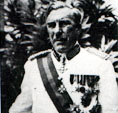
Political History Of Nigeria:
|
|||||
The vegetation in tile South is predominantly rain forest, but moving northwards one finds a belt of savannah and scrubland which gives way to the Sahara Desert. From across the desert came the earliest external influence to reach some of the areas now part of Nigeria. That was Islamic faith and ideas which began to filter from North Africa, first into Kanern-Bornu. Although, at the time, it was the religion of a few elite until the nineteenth century. The Niger River, the name from which Nigeria is coined, empties into the Bights of Benin and Bonny, through an intricate network of Delta characterized by a thick mangrove which the British ventured in order to get prized items of trade in the nineteenth century. But this was after the trade in slaves had been outlawed in 1833. SLAVE TRADE:
The external influence resulting from this trade brought tremendous impact on Nigeria. From the late 15th Century, Europeans began frequenting the Bights of Benin (now the Bights of Bonny), in search of tropical products and slaves. By the eighteenth century, the ports of Nigerian coastlines, mainly Lagos, Brass, Bonny and Old Calahar, had become centres of the trans-atlantic slave trade. Trade routes from these ports extended through the communities of the South to the Hausa States. But the industrial revolution and the advent of the machine made the trade unnecessary and unprofitable. The aftermath was an increased interest in palm oil trade.
In 1849, the British Government appointed John Beecroft as the Governor of Bights of Benin and Bonny His job was to regulate commercial relations with the coastal city States. Backed by fierce gunboats, he interfered with the internal affairs of these States and the process which culminated in the imposition of colonial rule came afoot. There were also missionary interests at play. In 1861, Lagos was proclaimed crown colony. And through the initiative of the United Africa Company, formed by George Goldie, through an amalgamation of British firms in 1879, most of the parts which became Northern Nigeria were preserved as British sphere to the chagrin of French and German competitors.
The Company received a charter to administer it until 1899 when the charter was revoked, and tile British Government administered it directly, under the name "Protectorate of Northern Nigeria" The Delta Area had itself been proclaimed the Oil Rivers Protectorate, following the signing of a number of treaties between the local rulers and British consular officials. Finally, in 1914, the two British administrations were merged, to form a single territorial unit known as Nigeria. This territory was administered by the British until 1960 when the Union Jack (British flag) was lowered for the Nigeria flag to take its place. >>>> History of Nigeria >>>> Nigerian Personalities >>>> Leader of Nigeria >>>> Country Profile >>>> Rulers of Nigeria
|
Write Your Comment
Search
Nigerian Government
The Federal Republic of Nigeria is governed in accordance with the provisions of a Constitution.In 1914 the Protectorates of Southern and Northern Nigeria were amalgamated with the Colony (Lagos) by Lord Lugard to form what is now known as Nigeria.
Nigerian Music
The music of Nigeria includes many kinds of Folk and popular music, some of which are known worldwide. Styles of folk music are related to the multitudes of ethnic groups in the country, each with their own techniques, instruments, and songs. Listen to music of Nigeria.




